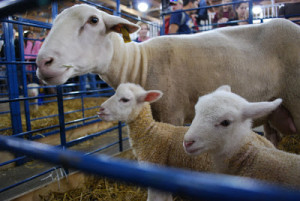
The California Department of Public Health (CDPH) and the California Department of Food and Agriculture (CDFA) are urging visitors attending fairs to practice good hygiene when visiting farm animal exhibits. Direct and indirect contact with the animals could put individuals at risk of developing Shiga-toxin producing Escherichia coli O157 (STEC O157) and other infections.
“Visiting animals can be one of the highlights of the fair,” said Dr. Charity Dean, CDPH Acting State Public Health Officer. “It is important to remember to practice good hygiene when working with or visiting animals.”
Every year, infections and illnesses in children and adults after exposure to animals at county fairs, petting zoos, and farms have been reported to public health. These have included bacterial infections such as STEC O157 and Salmonella, viruses such as swine influenza virus, and parasites such as Cryptosporidium.
There are steps you can take to protect you and your family at the fair, petting zoo, or other settings where farm animals are present:
* Wash your hands with soap and running water after touching animals or being in areas where animals are housed or exhibited, even if you did not touch the animal.
· Do not eat, drink, or put anything in your mouth while in an area where animals are housed or exhibited.
· Avoid touching your eyes, nose, or mouth until you have exited the animal area and washed your hands with soap and running water.
· Do not take toys, pacifiers, cups, baby bottles, strollers, or similar items into animal areas.
· Always supervise children around animals and supervise handwashing for young children.
· Don’t let children sit or play on the ground in animal areas.
· Avoid contact with animals that look or act ill.
People in high-risk groups should take extra care around animals. These include senior citizens, children under five, pregnant women, and people with a weakened immune system or chronic health conditions.
“We want all California families to enjoy their local community fair, but it is important for them to know good common sense precautions and be sure to wash their hands after contact with animals,” said CDFA Secretary Karen Ross.
If you develop any illness after visiting animal exhibits, including fever, vomiting/diarrhea, or flu-like symptoms, see your health care provider and inform them of your animal contacts.
For more information on how to stay healthy at animal exhibits, visit this Centers for Disease Control and Prevention (CDC) web page.
Additional information about STEC infections may be found on the CDPH and CDC websites.


